What is Machine Learning?
Machine Learning is the science of training your systems to collect data and make improvements to themselves, and then collecting some more data to improve some more! In other words, it is a never-ending loop of self-learning and self-improvement - whether supervised by a human brain or not.
What are ML tools?
Machine learning tools run a number of algorithms and tests, and also analyze massive amounts of data sets to make the optimum business decisions and predictions with the helo of AI. Based on the quality of outcomes, these permutations and combinations are run again to further improve on the services.
Business use cases for Machine Learning
Companies use machine learning tools for a number of reasons - to make more sales, to make better marketing pitches, to predict customer behavior, to reduce errors, to improve artificial intelligence in medicine, and so on.
The lessons and patterns that the human mind would take years to learn and implement would be discovered by machine learning tools within minutes, creating tremendous potential for the businesses or organizations that are using them.
What is the Best ML tool?
When it comes to machine learning tools, there is no “handyman”- no one tool can fix all problems because of vast variations in real-world situations and data. But there are ML tools that can fit your custom requirements like a glove.
To choose a primary ML tool for your solution, you need to assess your existing development process, production infrastructure, skills level of your team, compliance restrictions, and similar vital details to be able to pin down the right machine learning tool.
Benefits of Machine Learning Tools
Here are some of the reasons that adopting machine learning tools can prove to be beneficial to you.
- Next-level customer service: From handling customer queries to actually helping you pitch to a set of people who are the most likely to be your customers, the insights from machine learning tools can radically improve every element of the customer life cycle.
- Let’s you focus on things that matter: Machine learning tools can handle all the repetitive tasks for you, better than you would. And so, you and your team can focus better on the bigger picture and spend your time and energy on things that actually matter.
- Insights like never before: The sheer volume of things you can learn from machine learning tools is staggering. What you would learn in decades is what you could discover in a few minutes with just a few clicks!
- Reduced cost in the long run: Machine learning tools only get better with time. As a result, errors are almost close to zero. Besides, you will be better prepared for slumps in demand or other problems in the market in the future due to predictive analytics. Moreover, it will enable you to optimize marketing budget with artificial intelligence, thereby bringing you more value for investment.
One of the best machine learning examples would be image recognition. AI is trained to recognize the technical aspects of facial features to make no mistakes in recognizing an individual. Another deep learning example is predictive analysis, which is of great interest from a business perspective. Whichever machine learning examples you analyze, you will notice that it involves data collection, learning and improving, and that is what the ml tools we are going to discuss now deal with.
Top 15 Machine Learning Tools in 2022
Now that you have a fairly good idea about why machine learning program is so important, let us take a look at the top 15 machine learning tools in 2022. Many of these machine learning tools offer a number of use-case scenarios so that by studying each deep learning example, you can learn faster.
Table of Contents
1. Amazon Machine Learning
There is no doubt that Amazon Machine Learning is one of the easiest of the many machine learning tools out there and can prove to be a boon to you if you have a team of engineers who are comparatively inexperienced or if you don’t have a lot of time at hand.
In fact, Amazon has brought together so many features related to machine learning products and made them so accessible that they could easily dominate this market - whether it is their ease of deployment, personalization of services to customers, making business predictions, fraud detection - you just name it and you will find it with them.
Before we get into the features, pros and cons, please remember that Amazon Machine Learning products are a broad concept and not a tool in itself - they have a number of Machine Learning tools suited for different needs and companies.
Features:
- There are a number of services that you can choose to take up.
- Services are simplified so that not much machine learning expertise is required.
- Lets you work with a number of frameworks such as Pytorch, TensorFlow and so on.
- They have services that are HIPAA compliant for use by medical health setups.
- Open platform
Pros:
- Easy to create machine learning models
- Quick to deploy and scalable
- Very secure
- Inexpensive
Cons:
- None!
Price: You pay for only the services you use. Check out their website to calculate your cost, and to also use their free tier.
2. IBM
The main thing you will notice about IBM’s machine learning tools is their emphasis on ‘ease’. IBM’s services are quick to deploy and very easy to use for engineers without much background or experience in Machine Learning. With IBM, you can run even multiple models with just one click!
Features:
- One-click deployment
- Easy deployment, model training and even performance tuning
- Open-source
Pros:
- Easily manage your model lifecycle
- Easy integration
- Quick deployment
- Proactive customer service
- Highly scalable
Cons:
- Limited support for Apple products and devices
- No global support
Price: Contact them for pricing. They also have free tiers and demos.
3. Weka
Weka was engineered specially for the Cloud, and to address the challenges of space and speed that most other deep learning platforms pose.
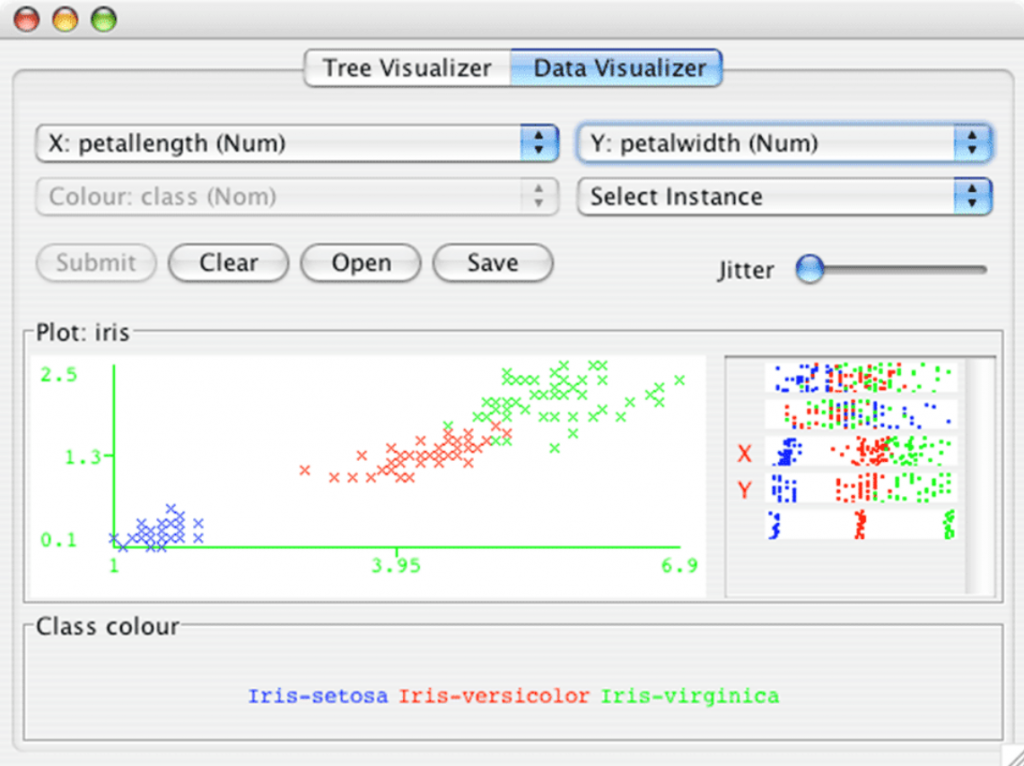
Weka is a one-platform machine learning tool, that can be of great help to you if your dependency on machine learning models and activities is very high, but has limited resources. Weka is especially proven to be of great help for data mining.
Features:
- Data can be read in multiple formats
- Management through Accelerated DataOps
Pros:
- Easy to get started with and use
- Great for data testing and analyzing
- Ample storage
- Data sets are neatly organized
- Extremely scalable
- Great data visualizations
Cons:
- Outdated UI
- Can be slow and laggy
Price: Contact them for pricing. You can even try out their free trial.
4. BigML
One framework to rule them all.
That’s what BigML has to offer. BigML’s machine learning tools believe in keeping things super simple, thereby reducing effort and cost. BigML lets you design your Machine Learning outcomes through either supervised or unsupervised learning methods.
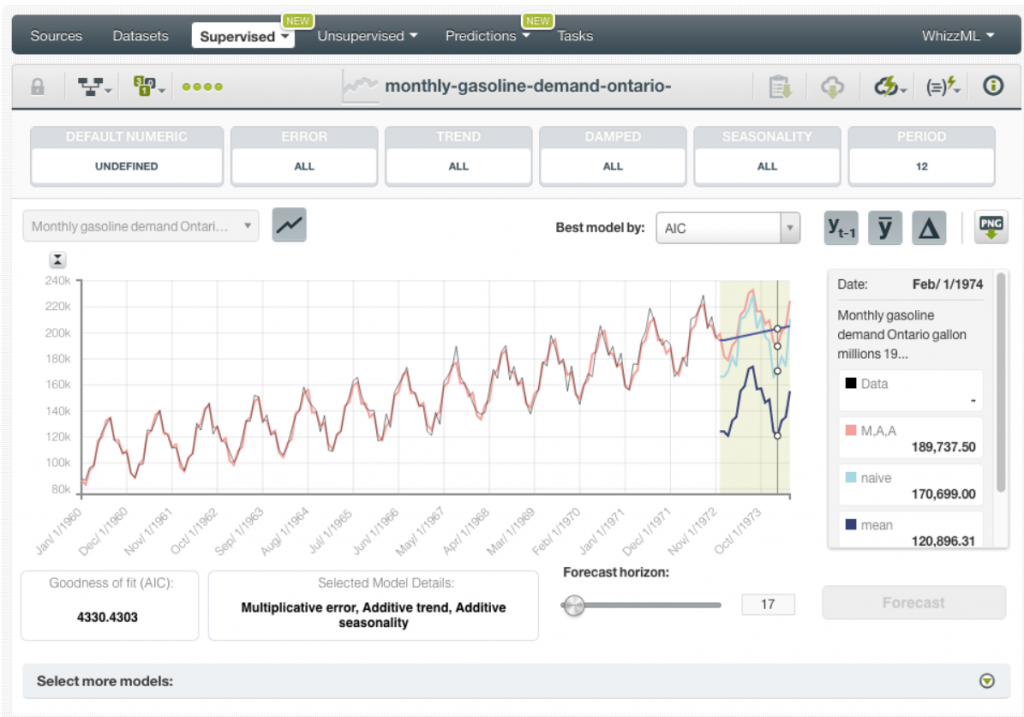
Besides, while you can expect reduced costs due to the elimination of multiple machine learning libraries, you can also make great business predictions as well.
Features:
- Models are interactive and can be exported easily.
- The dashboard is a shared workspace.
- Actions that are repetitive and time-consuming can be automated.
- Open-source
Pros:
- Records are easy to keep and retrieve
- A large number of data sets
- Data stored in Cloud
- Supports multiple languages
- Great customer support
Cons:
- Inaccessible offline
- Limited features in the free tier
Price: Starts at $10,000/year. They do have a limited free tier, however. Take a look!
5. PyTorch
PyTorch is one of the most versatile and robust machine learning tools that is all set to be used by anyone. They are already partnered up with popular Cloud Platforms such as AWS and Google Cloud, making it almost like a ready product that you just have to unpack.
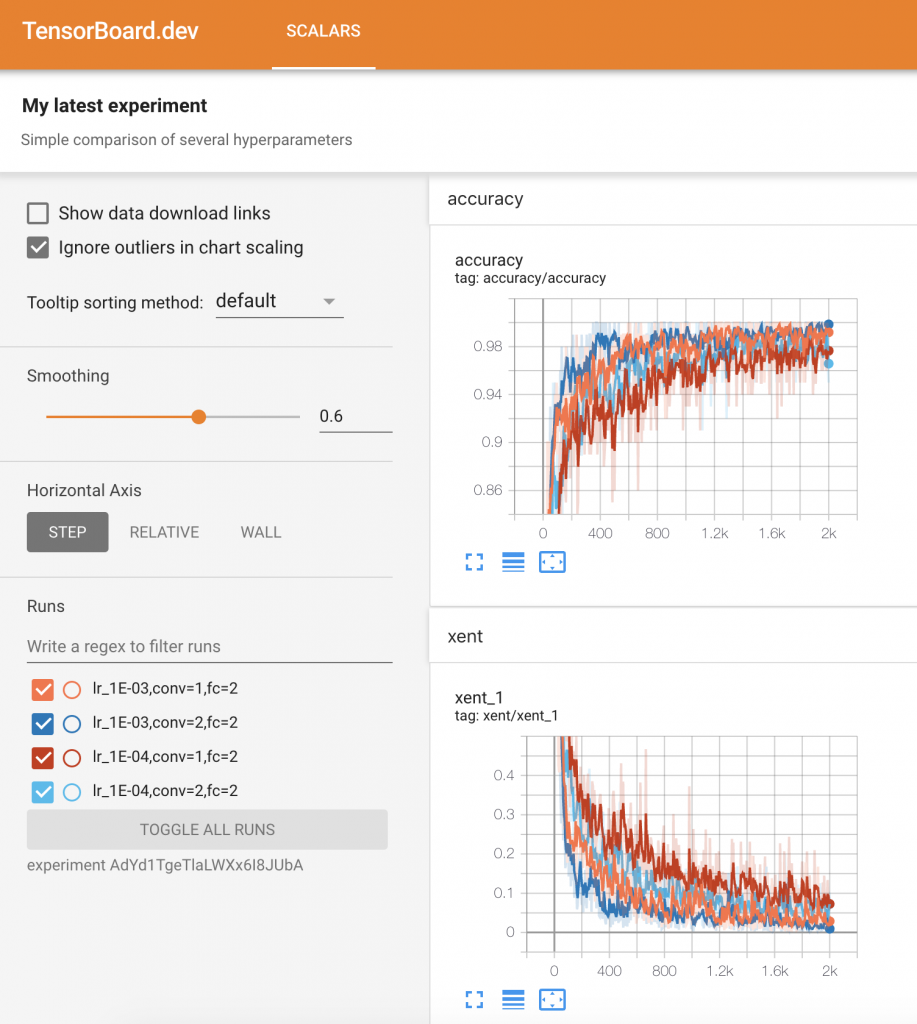
Whether you prefer to work in execute in eager mode or graph, PyTorch has been designed to give you optimum results either way.
Features:
- Supports deployment on iOS and Android
- C++ front-end
- Has a number of packages for different purposes.
Pros:
- Easy to use and deploy
- Team collaboration is possible
- Easy to migrate computation to GPU
- Works easily with the usual Python libraries
- Free
Cons:
- Limited community support
Price: Free
6. OpenNN
OpenNN uses something called as ‘neural networks’ for their implementations. Neural networks work similarly to how neural pathways in brains work - a set of algorithms work in sequence, recognizing different relationships.
Neural networks are said to be one of the most successful machine learning methods. This open-source library is great for many artificial intelligence functions such as regression and forecasting.
Features:
- Written in C++4
- Open-source
- Utilizes neural networks
- Designed for unit testing
Pros:
- Extensive documentation
- Ample examples and tutorials
- Designed for advanced analytics
- Quick execution and memory allocation
- Simple entry and data interpretations
- Free
Cons:
- Not easy to learn.
Price: Free
7. Tableau
Tableau couldn’t have put it better when they say that the purpose of their machine learning tools is asking questions and getting answers, and not just learning complicated software.

Tableau promises to make its data so accessible that you will be able to bring the data into all your business conversations. Needless to say, data is key to the very core of successful machine learning and with a tool that is as data-focused as Tableau is, there is just no going wrong!
Features:
- Has solutions according to industry, technology, or department.
- Compatible across multiple devices
- Tableau is specially designed for data collection and analysis
- As a Business Intelligence software, Tableau is great to use along with other machine learning tools.
Pros:
- In-depth insights and analysis
- Easy presentation of data
- Offers Cloud Migration
Cons:
- Not specifically Machine Learning tool
Price: Starts at $180/year. Try out their free tier.
8. RapidMiner
No matter at what level you may be in terms of how little you know about data science and AI, machine learning tools like RapidMiner have got you covered.
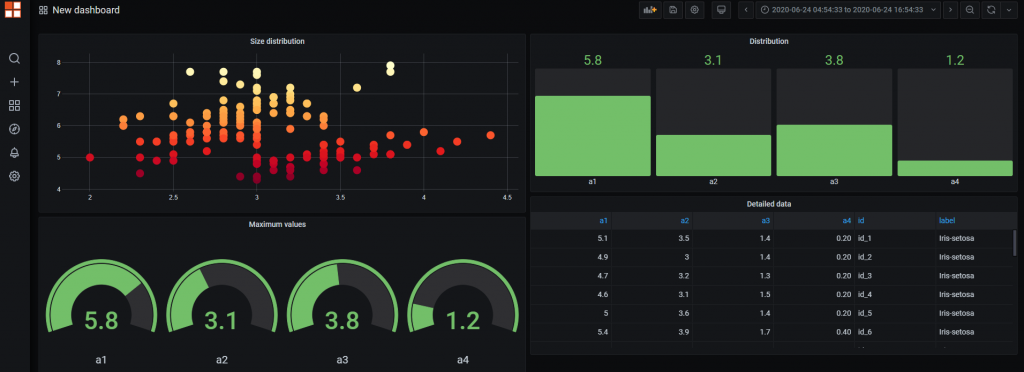
RapidMiner is focused on automating data science through its three services - Turbo Prep, Auto Model and Model Ops - and does so in a way that is quick and easy for anyone. With RapidMiner, you can expect to collect, organize and analyze your data and deploy your models without a sweat.
Features:
- Data interaction and visualizations.
- Pre-built algorithms.
- Solutions are available by use-case or by industry.
Pros:
- Drag-and-drop model
- Easy to get started with
- Plenty of support resources
- Wide variety of algorithms
- Integrates with almost everything
Cons:
- Documentation has a lot of jargon
- Buggy integration with Python
Price: Paid version starts at $10/month. You can also try their free version.
9. DataRobot
DataRobot claims to be one of the only ml tools out there to automate the entire lifecycle of data science - from raw data to outcomes. Needless to say, if DataRobot has such a tremendous capacity, then it would also have some of the most advanced features that machine learning tools can have.
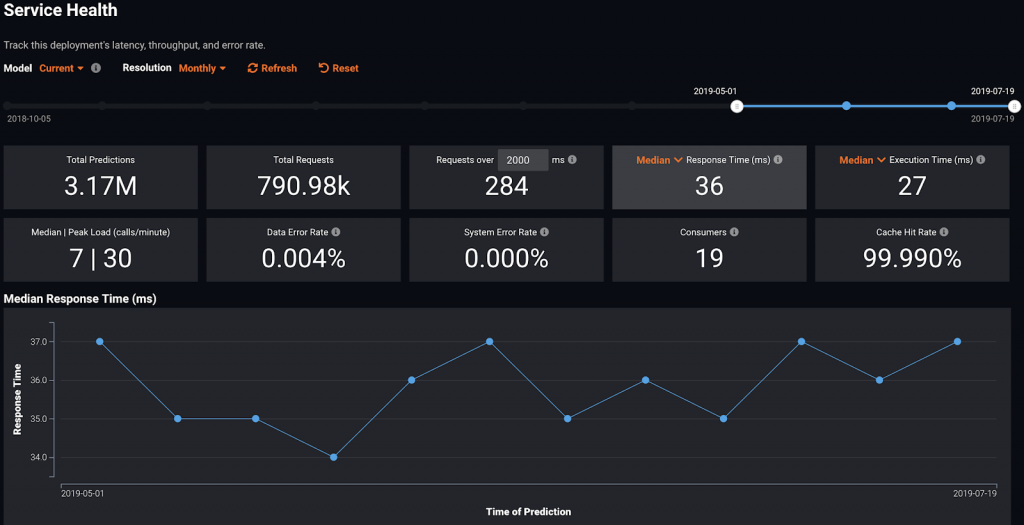
Whether it is data collection, analysis, selection of algorithms, or even deployment, DataRobot can do all these things automatically for you - and if that’s not awesome, we don’t know what is!
Features:
- End-to-end automation
- AI applications at an enterprise scale
- Open-source machine learning libraries are available
- Centralized dashboard to see all stats in real-time
Pros:
- Accurate predictions
- You can build your own models
- Easy-to-understand data visuals
- All models are ready to deploy
Cons:
- Expensive
Price: You have to contact them for prices. Meanwhile, you can try their free version here.
10. H2O Driverless AI
“AI to do AI”
Can you imagine the potential of this? H2 Driverless AI automates the key areas of machine learning that would otherwise take you hours - perhaps even months.

If you could get your desired results within minutes instead of waiting for that long, what more could you want?
Features:
- Automatic feature engineering technology
- Has Open-Source machine learning libraries
- You can pick solutions by Use Cases or by Industry
- Completely driverless architecture
Pros:
- Automatic feature engineering
- Automatic model deployment
- Data from different kinds of data sets
- Exceptional customer support
Cons:
- No major drawbacks
Price: Contact them for pricing. Meanwhile, check out their free trial here.
11. Trifacta
If you ask us what the one thing is that makes Trifacta different from the usual machine learning tools out there, it would be that it’s only they who offer low-code or no-code collaboration, authoring or sharing - that too with massive potential for scalability!
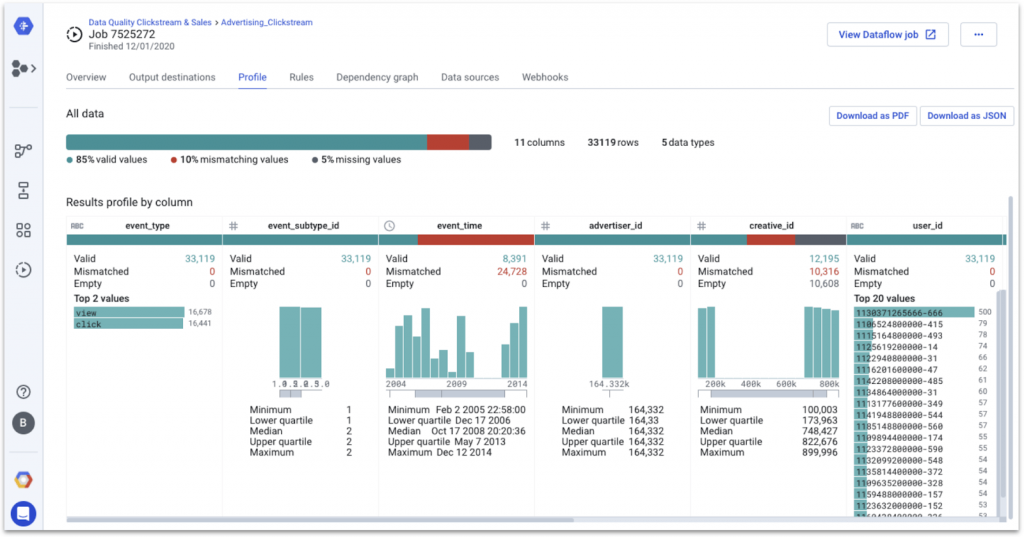
This is apart from the other usual, but excellent, features such as support to all clouds, easy and neat organization of data and so on.
Features:
- Very focused on data engineering
- Compatible with AWS, Google Cloud, Snowflake and so on.
- Offers predictive analysis
- Offers low/no-code authoring
Pros:
- Easy to use
- Easy to identify and avoid errors
- Recommends suggested transformations
- Excellent documentation
Cons:
- Buggy performance overall
Price: Starts at $80/month. You can try out their free version or take a look at their demo here.
12. TensorFlow
TensorFlow helps novices build robust machine learning models across various deep learning platforms. This machine learning tool lets you work step-by-step, providing you with all the support and information you can need.
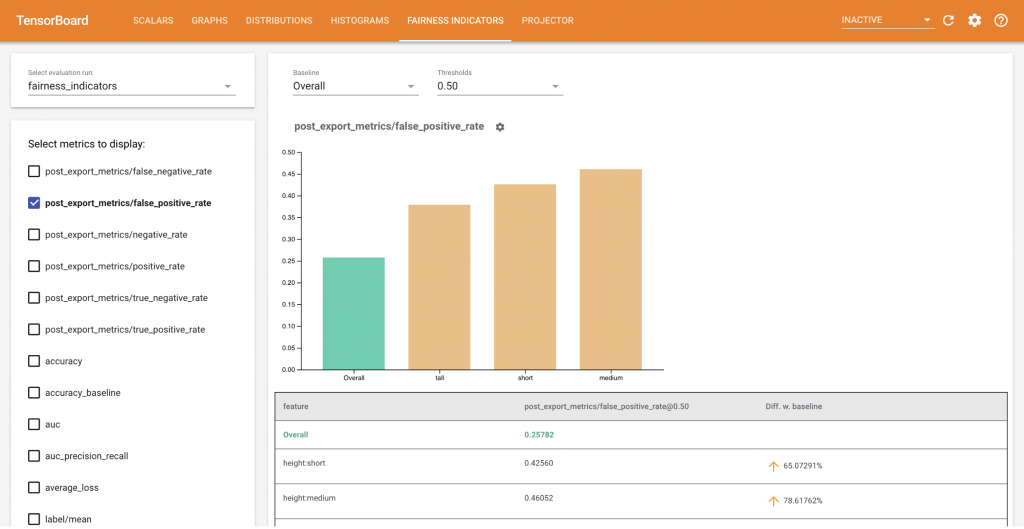
Since it is an open-source library, it is just perfect for individuals who are just starting out in this field and have more or less basic needs.
Features:
- Open-source library
- Has pre-built algorithms
- Works on artificial neural networks
Pros:
- One of the easiest machine learning tools
- Not much knowledge of Python is required
- Deployment of models in all languages
- Keras Functional API
- Model Subclassing API
- Free
Cons:
- Requires a lot of data for training
Pricing: Free
13. Google Cloud ML
We don’t have to introduce Google. The name itself should tell you that this will be one of the most state-of-the-art machine learning tools that will give you everything you could need, packaged in a simple, easy-to-use way. Integrating Google Cloud ML into your website or applications is fast and easy.
Features:
- Has a number of services
- Predictive analytics and forecasting
- Uses Google’s network of distributed computers
Pros:
- Robust and vast
- Runs algorithms on multiple computers
- Can handle complex data processes
- Easy storing of data
- Human labeling services
Cons:
- Privacy concerns
- Expensive with increasing needs
Price: Contact them for pricing. You can get started with their $300 credit.
14. Accord.NET Framework
Written completely in C++, Accord.NET Framework can be used for a number of purposes such as classification, regressions, Imaging and so on.
Getting started is easy, thanks to the many sample documentations that they provide, along with a lot of support resources.
Features:
- Audio and image processing libraries are available.
- Written entirely in C++
- Machine learning libraries are available
Pros:
- A wide array of applications
- Ample support for a quick start
- Free
Cons:
- Not too advanced
Price: Free
15. Apache Spark MLib
While Apache Spark is a data-processing tool and an open-source analytics engine, MLib is one of the best machine learning libraries that is used along with the other services of Apache and perhaps, other machine learning tools as well.
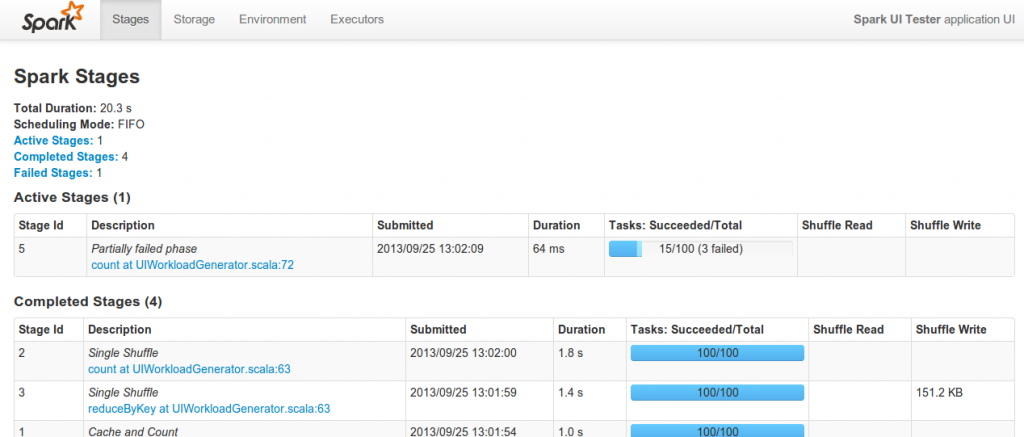
Engineered mainly for embedded systems, this small but robust machine learning tool is a C software framework as well.
Features:
- Compatible with Python, R, Java and Scala
- Its performance is powered by Spark
- Gets updated and improved every time Spark does
- You can have your own memory manager
Pros:
- Fast and reliable
- Has many algorithms and workflows
- Data can be accessed from any source
- Seamlessly deployment of threads
Cons:
- Very dependent on Spark
- Not too advanced
Price: Free
Final Thoughts!
We hope this list of the top machine learning tools in 2022 has proved to be of some help to you. Remember, each of these machine learning tools has its own edge over the others - and we have simply given you a general idea of each. Now it’s up to you to delve in-depth into each and see what suits your business needs best. Always remember, ‘free’ machine learning tools don’t always mean ‘good’ results. Besides, you don’t have to stick to just one machine learning program anyway. Go crazy - after all, the sky is the limit to your business growth!















Leave a Reply